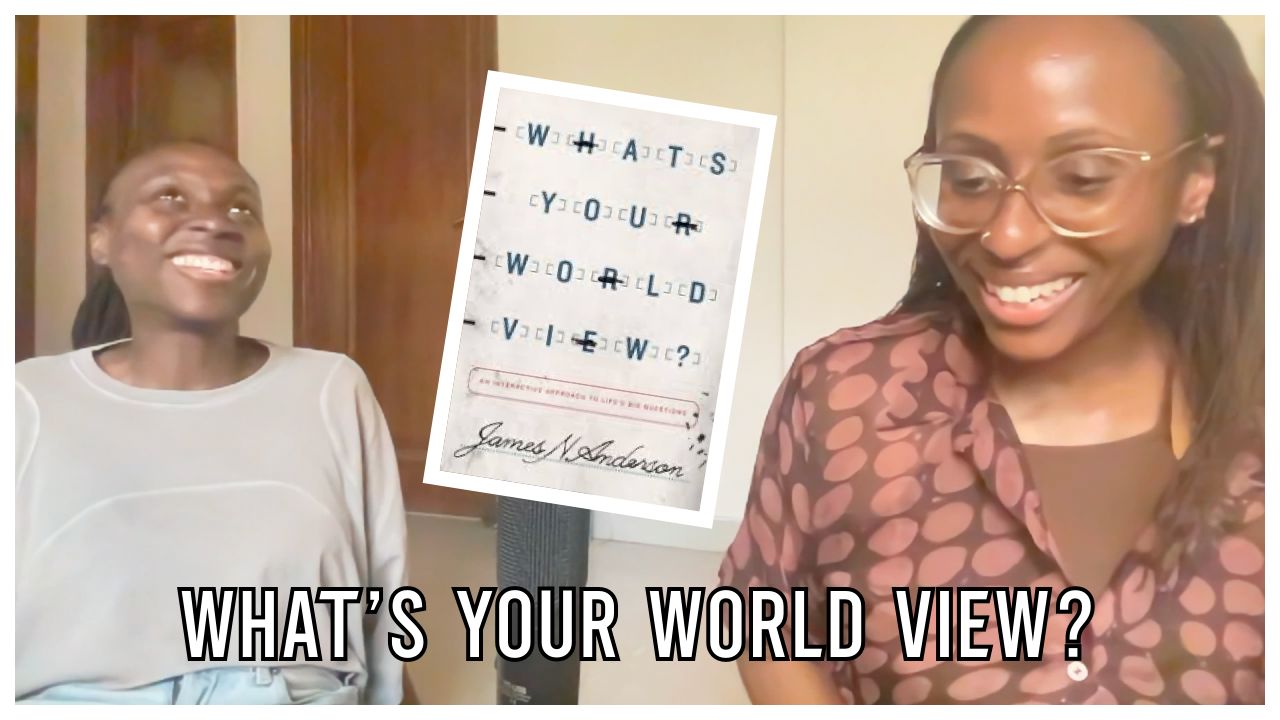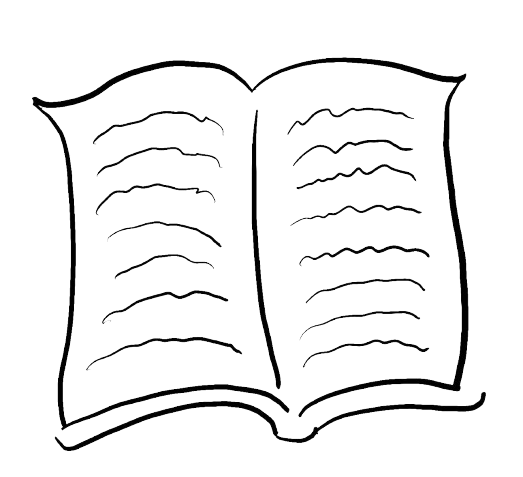
What's your worldview?
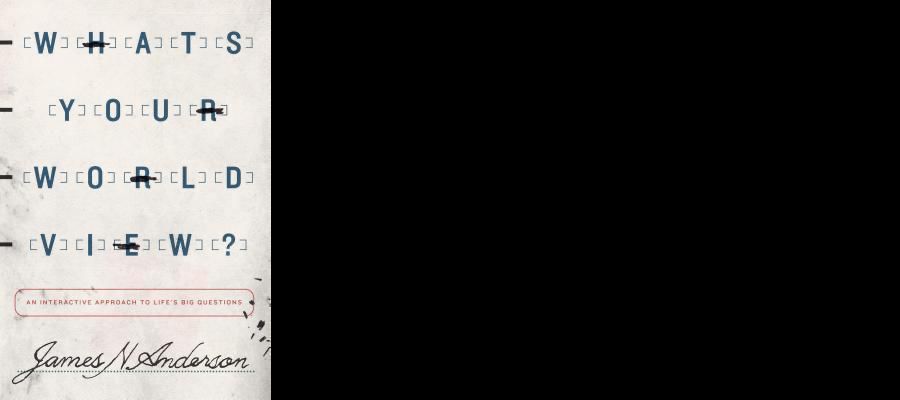
I recently read the book, “What’s your worldview?”, by James Anderson. It’s not a normal book that you read from start to finish, but rather a “choose your own adventure” style book. You're asked a series of yes-or-no questions that guide you to different pages, ultimately leading you to a specific worldview.
What is a worldview?
The first question you may be wondering is, what exactly is a worldview in the first place? The book describes it as:
a philosophical view of the world - and not just of our planet, but of all of reality. A worldview is an all-encompassing perspective on everything that exists and matters to us
A worldview impacts everything about how you see the world, from what you think the meaning of your life is, to your thoughts on ethics and politics.
What you think about abortion, euthanasia, same-sex relationships, public education, economic policy, foreign aid, the use of military force, environmentalism, animal rights, genetic enhancement, and almost any other major issue of the day depends on your underlying worldview more than anything else
What’s my worldview?
The way the book works is, you answer a series of yes-or-no questions, which lead you to a worldview. The questions are difficult, but you have to answer yes or no to them. There is no, “I don’t know” (which is, in itself, a potential limitation of the book).
When you land on a worldview, the author, Anderson, gives a description of it, including what he thinks are the positives and the shortcomings. If you feel the description doesn't quite capture what you believe, you can go back and revisit a question and perhaps be led to a different worldview. Because of this, I came up to three worldviews before I arrived at something I thought was sort of close to what I actually believe.
Here, I’ll share those worldviews, and how I answered the questions to lead me to those views. I’m not able to go into as much detail on my rationale for each question and worldview here, but if you’re interested in hearing me talk about this more, you can listen to a podcast I recorded with my sister discussing each question and worldview in much more detail.
(If you’re interested in reading the book for yourself, I suggest you stop here and go through it yourself before reading on)
Nihilism?
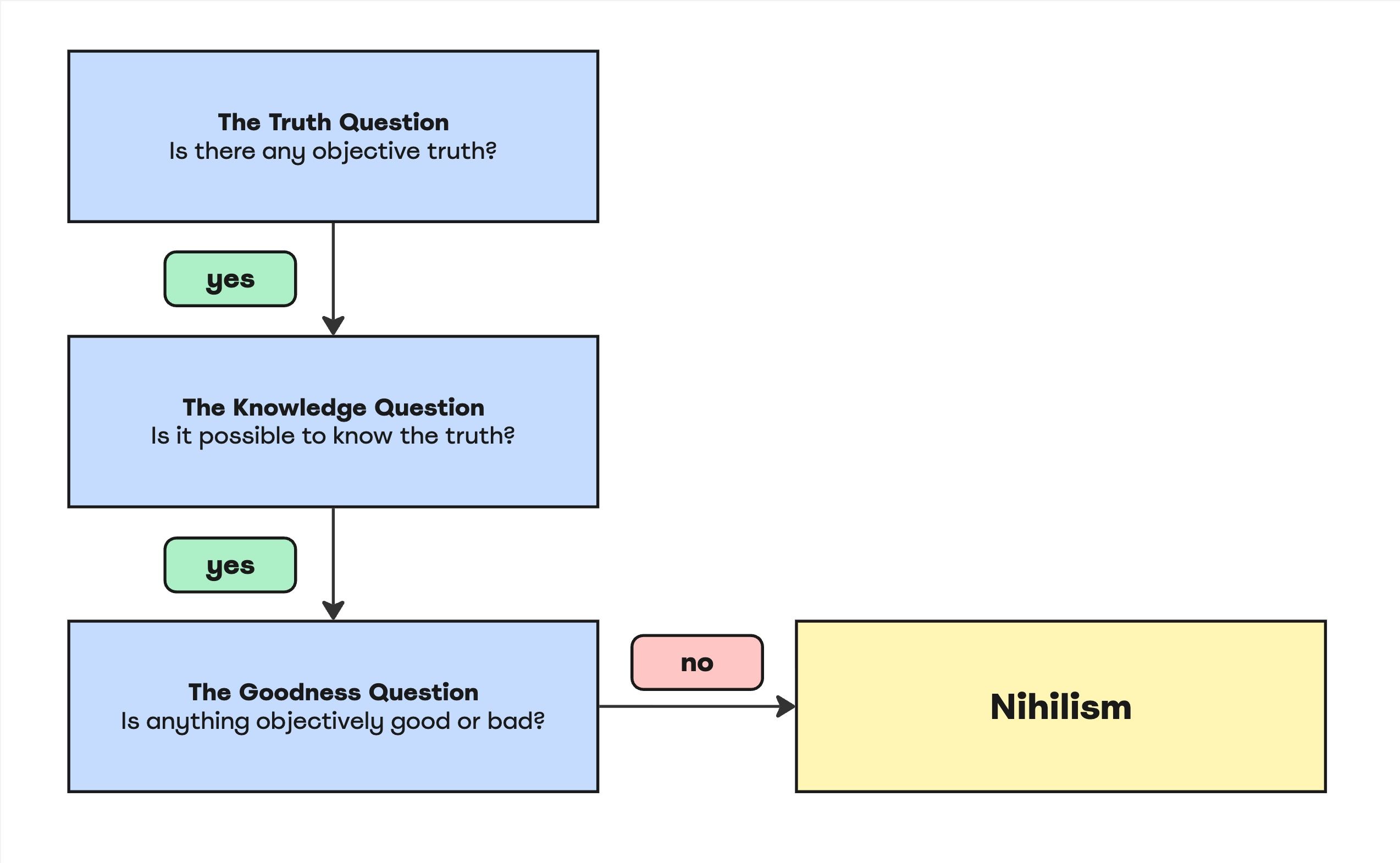
The first worldview I landed on was Nihilism. The book describes Nihilism as the view that "nothing is really good or bad in any objective sense... Nothing is ultimately right or wrong, good or bad, justified or unjustified".
While I do somewhat resonate with Nihilism, I think it can be misunderstood. A major problem I have with Anderson’s definition of Nihilism is that it doesn’t acknowledge that actions can matter subjectively, even if they technically don’t matter objectively. Just because a nihilist doesn’t believe that actions are “objectively” wrong, doesn’t mean they don’t realise that actions do have an impact on others and therefore they do matter, just subjectively.
In my view, there are different levels of objectivity. While going through this book, I tried to look at what is objective outside the experience of humans. As Anderson said, a worldview is “not just of our planet, but of all of reality”. Taking this view, I think it’s hard to say that anything is objectively good or bad.
That said, I wasn’t satisfied with Anderson’s description of Nihilism, so I decided to return to the Goodness Question and answer yes, and continue down to another worldview.
Materialism?
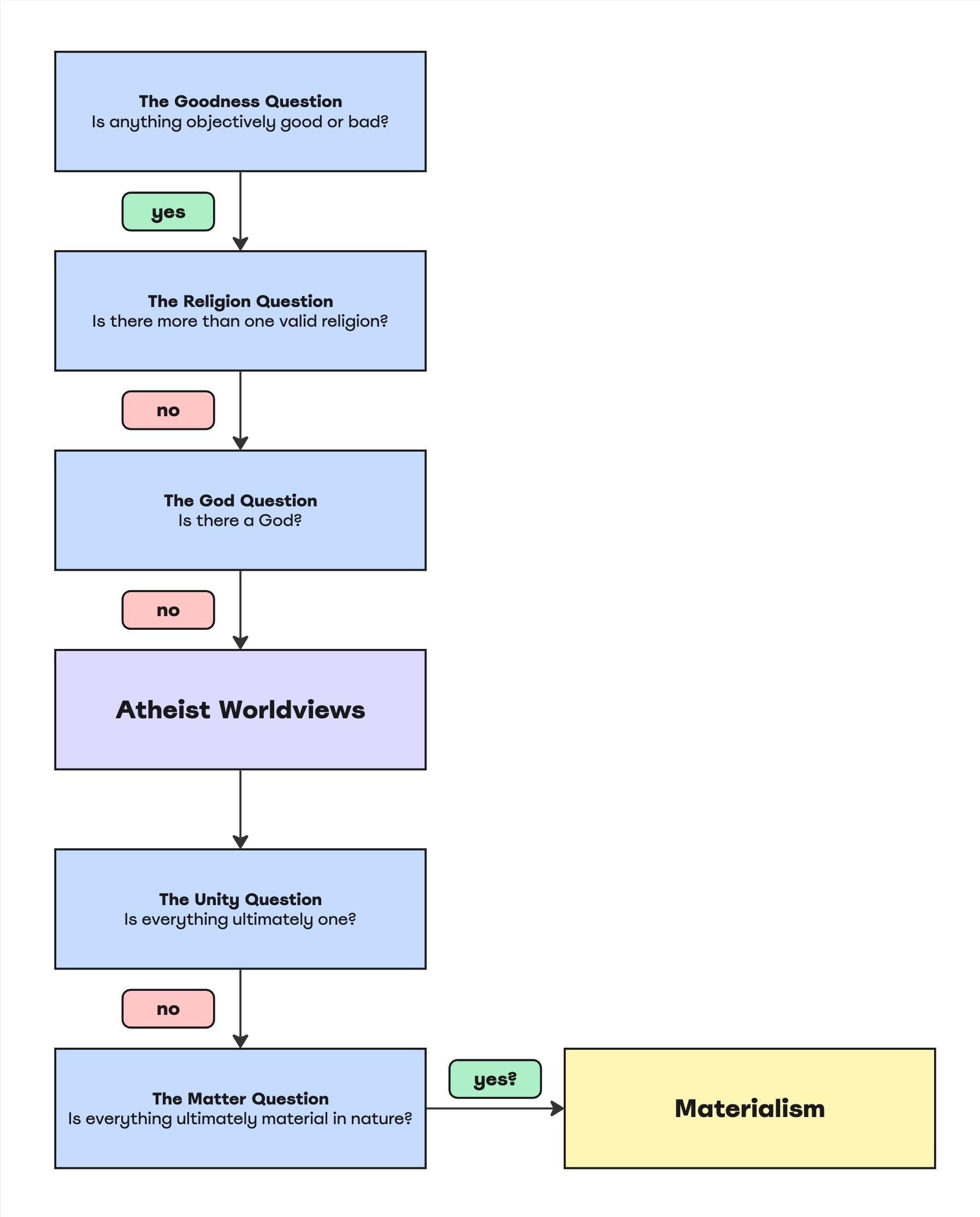
The next worldview I landed on was Materialism, which is the view that “everything is ultimately material in nature”.
This worldview didn’t particularly resonate with me. I already struggled with answering yes to the Matter Question. My gut did say yes, that everything is material in nature, but I had strong doubts with this answer, because I do think the mind or consciousness is not material itself, but is an emergent factor of the material brain.
Given this, I decided to return to the Matter Question and answer no.
Atheistic dualism?
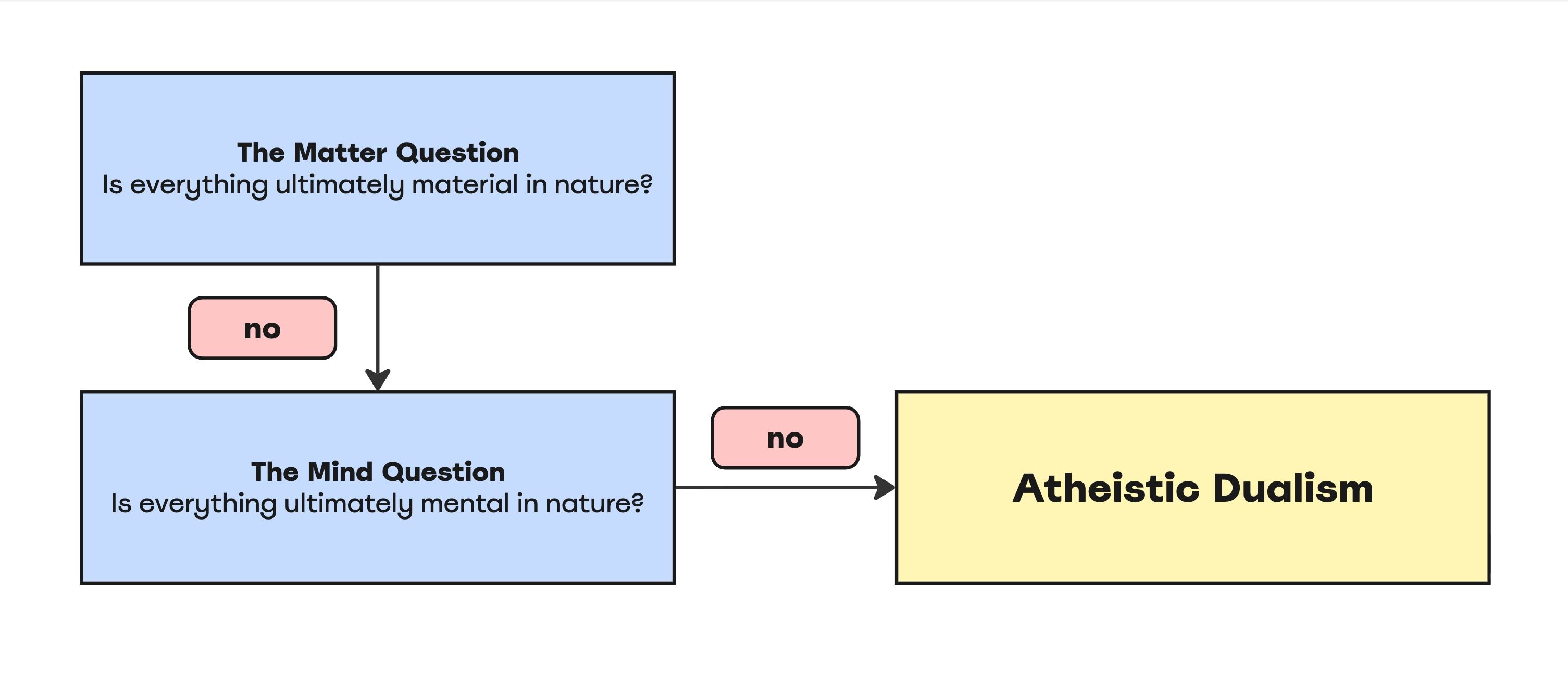
The final worldview I landed on was Atheistic Dualism. This is the view that “everything that exists is either material or mental, or some composite of the two”.
I stopped here because I think, in this book anyway, this is likely the closest I will get to my actual worldview. But, I don’t think it was quite there.
What’s my (actual) worldview?
While I enjoyed going through this book, I found it quite frustrating for a number of reasons. Primarily, I do not think it properly accounted for worldviews such as Agnostic Atheism, which is what I actually think my worldview is.
The book perpetuates a common misunderstanding of agnosticism and atheism that always frustrates me. It considers them mutually exclusive, when in fact they can work together. Agnosticism is a statement of one’s knowledge, saying “I do not know anything for certain”. Atheism is a statement of one’s belief, saying “I do not believe in a God”. So it’s entirely possible for someone to be like myself, an angnostic atheist, and say I do not know if a God exists, but my belief regardless is that one doesn’t.
In Anderson’s criticisms of certain worldviews, he always states that the fact that they do not provide a definitive answer for “where do we come from” as a major limitation, but I really disagree, and I think this stems from his own bias because his worldview does provide an answer to this question.
Which brings me to my second major frustration with this book, which is how biased it was towards Anderson’s own worldview, Christianity. While reading the book, I specifically did not want to look up the author to find out what his own worldview is so I wouldn’t know his biases, but going through the book, it became really obvious. Although he stated in the introduction that he would be biased, I found his bias too glaring.
Summary
I think this book did a good job in sparking a discussion and making me think of questions and ideas I never fully articulated before. Because of that, I would recommend that anyone go through it themselves, even with my frustrations with how things are represented in it.
If you’re interested, you can watch me and my sister discuss this book and our worldviews on a (very informal) podcast we do together.
So, what’s your worldview?

